SCERT AP Board 10th Class Social Solutions 15th Lesson National Liberation Movements in the Colonies Textbook Questions and Answers.
AP State Syllabus SSC 10th Class Social Studies Solutions 15th Lesson National Liberation Movements in the Colonies
10th Class Social Studies 15th Lesson National Liberation Movements in the Colonies Textbook Questions and Answers
Improve your learning
Question 1.
Match the following.

Answer:
1. C
2. A
3. D
4. B
![]()
Question 2.
Trace the changes in the role of women seen in China over the decades. Why is it similar or different from that of the USSR and Germany?
Answer:
- Long back Chinese women were forced to follow the practice of footbinding, they were subordinated and sufferers, of polygamy.
- They were not allowed the public life.
- Till 1940s they were confined to household.
- Mao supported the emergence of rural women’s associations, stopped purchase or sale of marriage contracts.
- After New Democracy women got protective rights and polygamy was abolished.
- It is similar to women of the USSR who were provided with rights after revolution.
- In Germany no such provisions were there till the end of Second World War.
Question 3.
After the overthrow of monarchy, China had two different types of regimes. How were they similar or different? (Or) Trace out the political conditions in China after throwing over monarchy.
Answer:
After the overthrow of monarchy, China had two types of regimes. The Guomindang (The National People’s Party) under Chaiang Kai-shek and the Chinese Communist Party (CCP) under Mao Zedong.
Similarities:
- Both the parties wanted to unite the country and bring stability.
- Both spread education by starting schools.
Differences:
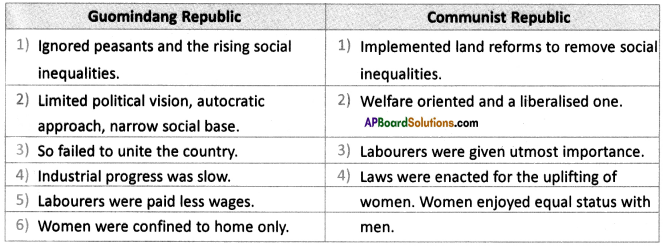
Question 4.
Countries discussed in the above chapter were all mostly dependent on agriculture. What were the measures taken in these countries to change these practices?
Answer:
- In China, the major steps were a class identification of all villagers, followed by the confiscation and redistribution of land lord and other productive property.
- In Vietnam, French began building canals and draining lands in the Mekong delta to increase cultivation. The vast system of irrigation works, canals and earth works built with forced labour increased rice production.
- In Nigeria, the British developed trade in agricultural produce i.e., palm oil and cocoa.
Question 5.
Who owned industries in countries discussed above and what policies were brought in to change the systems? Make a table to compare them.
Answer:
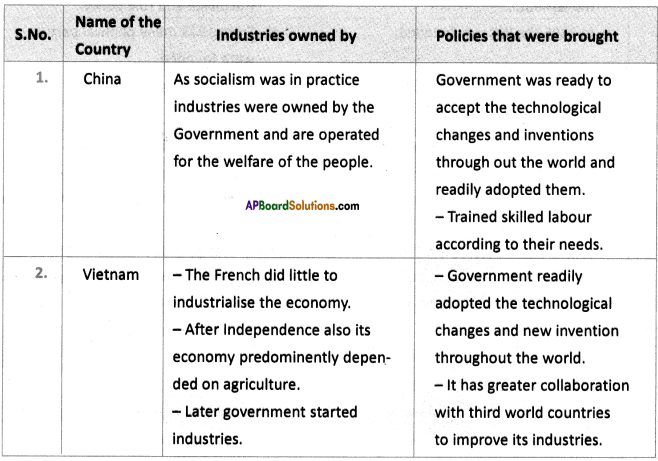
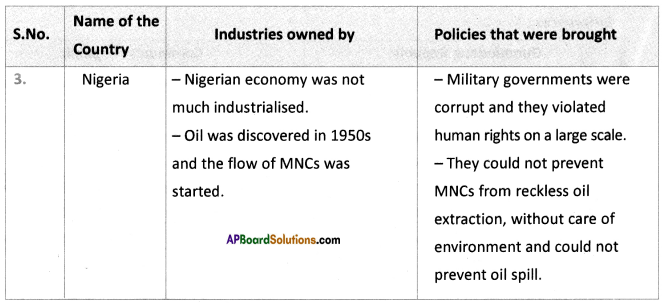
![]()
Question 6.
Compare the national movement in India and Nigeria – can you explain why it was stronger in india?
Answer:
Comparison:
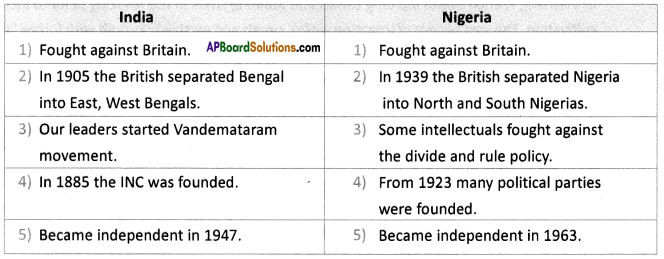
Explanation:
- Compared to National Movement in Nigeria, that in India was stronger.
- Social reformers in India and educated youth brought in the changes.
- The introduction of newspapers and political organizations were started nearly 100 years before Independence.
- Most classes of society included in the National Movement, thus it was stronger.
- Whereas in Nigeria political parties and youth movements were only 30 to 40 years old.
- Their nationalism plagued by ethnic conflict between the Yoruba and Igbos.
Question 7.
What are the challenges faced by the independent Nigerian nation? In what ways is it similar or different from the challenges faced by independent India?
Answer:
- Nigeria became Independent on October 1st, 1963.
- Unfortunately a just and balance democracy could not be worked out there.
- Soon it slipped into civil war and military rule resulted in domination of the North.
- Corruption and suppression of human rights went hand in hand.
- The multinational oil corporations funded the military rulers and still facing challenges of building a democratic nation.
- On the other hand, India successfully functioning as the world’s biggest democracy.
![]()
Question 8.
Unlike Vietnam or India, Nigeria did not have to struggle so hard for freedom. Can you find some explanations for this?
Answer:
- Vietnam had paid great loss in the freedom struggle.
- Vietnam also faced a war with the USA in the struggle.
- India also paid great loss in the freedom struggle.
- Indians fought against the British to get freedom.
- In Nigeria a section of western-educated intellectuals developed the idea of a common Nigerian nation and began to fight the British rule.
- Nigerian nationalism grew in popularity.
- By that time England has granted independence to many countries and unable to maintain colonies.
- Considering the wave of nationalism, the British decided to hand over power to Nigerians.
Question 9.
What role did schooling play in national movement of the countries discussed above?
Answer:
- Both the influencial personalities in China Sun and Mao were well educated.
- Post New Democracy era Chinese universalised education.
- In Vietnam students fought against the colonial government through newspapers and political parties.
- Ho Chi Minh was also well educated.
- The role of students and educated youth is invaluable in Nigerian liberation movement.
Question 10.
Freedom struggle in these countries involved wars against the rulers. Briefly describe its impact.
Answer:
- China was attacked and occupied by Japan between 1937 and 1945.
- Both Guomindang and CCP tried to join forces to fight Japan.
- After Japan’s surrender to US, both CCP and Guomindang engaged in war with each other.
- CCP became ruler in main land of China and Guomindang set up government in Taiwan.
- Vietnam waged 8 year long war with France and got independence but was divided.
- North Vietnam under Ho Chi Minh was again attacked by US and war lasted 7 long years.
- Finally a peace agreement was made and Vietnam was united.
- Nigerian organisations, Nigerian soldiers tried to fight with the British.
- Considering the wave of nationalism, the British decided to handover power to Nigerians.
10th Class Social Studies 15th Lesson National Liberation Movements in the Colonies InText Questions and Answers
10th Class Social Textbook Page No. 202
Question 1.
Observe the following map and answer the given questions.
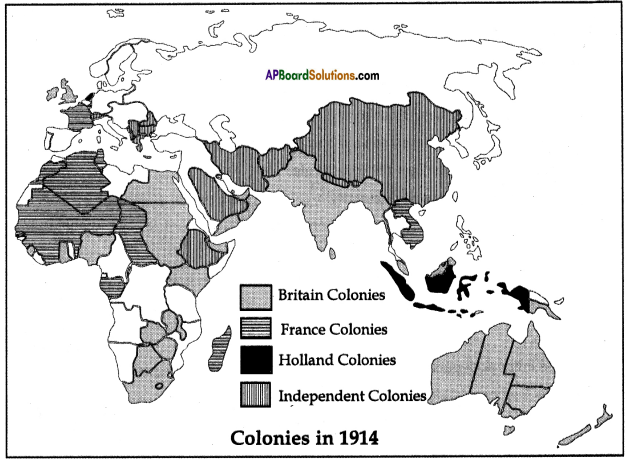
(a) Identify one Asian and one African colony of Britain.
Answer:
India is the Asian and Nigeria is the African colony of Britain.
(b) Identify one Asian and one African colony of Holland.
Answer:
Indonesia is the Asian and Western Sahara is the African colony of Holland.
(c) Identify one Asian and one African colony of France.
Answer:
Vietnam is the Asian, Algeria is the African colony of France.
(d) Identify two Asian and one African country that was not colony of any power.
Answer:
China and Russia are the Asian and Ithiopia is the African country which was not a colony of any power.
(e) Whose colony was Australia?
Answer:
Australia was the colony of the British.
10th Class Social Textbook Page No. 203
![]()
Question 2.
Recall/ Revisit Class IX textbook as to what constitutes the idea of Nationalism and how it emerged.
Answer:
The idea of nationalism constitutes to develop a sense of common identity and shared history and descent.
Nationalism emerged due to
- Oppressive rule of the colonial rulers.
- Liberal ideas spread by philosophers and leaders.
- Culture, art, pointing, poetry etc. also helped to express nationalist feelings.
Question 3.
If the traditional rulers of these countries had fought for freedom, what kind of political systems would have been created?
Answer:
If the traditional rulers of these countries had fought for freedom, monarchial kind of political systems would have been created.
Question 4.
In colonies which social groups have fought for freedom? And why were the ideas of equality and democracy important to them?
Answer:
- In colonies mostly educated and the youth fought for freedom.
- Apart from them peasants and at times, women also fought for freedom.
- There was support from soldiers for these liberation wars.
- Most commonly, all the above fought under the leadership of powerful leaders who envisaged the independence of their colonies.
- The idea of equality and democracy is important for them as their old emperors are military rulers who did not give them freedom and equality.
10th Class Social Textbook Page No. 204
![]()
Question 5.
Why do you think young” Chinese wanted to fight both against old traditional practices and against foreign powers?
Answer:
- Young Chinese wanted to fight both against old traditional practices and against foreign powers.
- The old traditional Chinese language and script are very complex, the practice of foot binding is against the dignity of women.
- There is the subordination of women and no equality in marriage, and poverty is more prevalent.
- Despite being an ally of the victorious side led by England, China did not get back the territories seized from it by Japan.
- So they tried to attack old tradition.
- Revolutionaries called for driving out the foreigners, who were controlling the country’s resources.
- So they wanted to be against the foreign powers.
Question 6.
Did something similar happen in India?
Answer:
- Yes. Something similar happened in India.
- Indians resented the old practices like Sati, Polygamy, Untouchabilities, Child Marriages, encouraged widow remarriages and girl child education, etc.
- Many peasant movements, socio religious movements were conducted.
- People resented the British rule.
- They wanted to drive the British away.
10th Class Social Textbook Page No. 205
![]()
Question 7.
What were the major political parties that emerged during the period? (In China)
Answer:
- After the republican revolution in 1911 the country entered a period of turmoil.
- The Guomindang (the National People’s party also called KMT – Kuo Ming Tong) and the Chinese Communist Party are the two major political parties emerged during the period.
Question 8.
Who were the members of such mobilisation? (In China)
Answer:
Peasants, labourers, women and students.
Question 9.
What was the nature of their social and economic changes that were thought of?
Answer:
- Mao Zedong was for the abolition of land-lordism and built army with peasants.
- Through confiscation of land of the landlords, he distributed the land among peasants.
- He supported the rural women’s associations, stopped purchase and sale of marriage contracts.
- He fought foreign imperialism.
- Achieved universalisation of elementary education was achieved in initial years.
- Freedom and equality.
10th Class Social Textbook Page No. 207
Question 10.
In what ways did the land reform programmes help CCP win the war?
Answer:
- It is generally agreed upon by the scholars that the successful carrying out of the land reforms and universalisation of education achieved in the initial years of the revolution formed a solid basis for the future development of China.
- The CCP gradually established a single party rule in which the supreme leaders or Chairman was all powerful.
- All opposition activities were disallowed.
Question 11.
Compare the land reforms carried out in China with that of India. What were the similarities and differences between them?
Answer:
Land Reforms carried out in India:
- In India Zamindari and Mahalwari systems were abolished and the Ryotwari system was introduced.
- Land Ceiling Act was implemented and the distribution of surplus land to the poor was taken.
Land Reforms carried out in China:
- Identify the all village inhabitants.
- Confiscation of all village lands and redistribution of land lord’s land and other productive property.
Similarities:
- The land was distributed among the poor peasants in all the cases.
Differences:
- Unlike India, in China it was done with force and incurred human loss but in India we see very rare occasions of deaths of land lords.
![]()
Question 12.
Do you agree with the view that equal participation of men and women and equal opportunity for them is necessary for freedom and development of the country?
Answer:
- I agree with it. Equal participation of men and women is necessary for freedom and development of the country.
- And availability of equal opportunity to both men and women is necessary for freedom and development of the country.
- That is why our Constitution promised these equal rights and opportunities to men and women.
10th Class Social Textbook Page No. 209
Question 13.
Why were the railways and canals developed in Vietnam by the French?
Answer:
- The French were keen to develop Vietnam as an exporter of rice.
- For this purpose they made a three fold strategy.
- That includes improving irrigation network, encouraging landlords and encouraging marketing of agricultural produce like rice and rubber.
- Thus, French started building canals and draining lands in the Mekong delta.
- It was followed by infrastructure projects to help transport like roads and railways.
Question 14.
What was the difference between a landless peasant and landless workers?
Answer:
- There was difference between a landless peasant and landless workers.
- Landless peasants practice only cultivation either taking land on rent or attending the agricultural works or both of them.
- On the other hand landless workers do not practice cultivation.
- They only attend to agricultural work or in absence of these they will search for another employment or settle in activities other than agriculture.
![]()
Question 15.
You read about the condition of peasants in the British rule in India, in what ways was it similar to that of Vietnam ?
Answer:
- The condition of peasants in the British rule was miserable.
- They were under the burden of heavy taxation and no exemption of taxes during crop failures and natural calamities etc.
- In Vietnam also the peasants who rented the land of landlords had to pay rent in both share of produce and also by working on the fields of them.
- They need to pay different taxes imposed at the will of landlords.
- These forced them to debt bondage.
Question 16.
Try to remember the policies followed by the British in India. Compare the colonial policies followed by the British in India and the French in Vietnam. What similarities and differences do you find between them?
Answer:
- The colonial policies of both the British and the French were the same.
- Both of them provided irrigation water by digging canals and that provision of transport systems like roads and railways.
- They administered the colonies.
- All these expenses were charged from the revenue of the country.
- These sums were taken to their native countries.
- Vietnam was encouraged to cultivate rice by the French whereas the British forced for the cultivation of indigo, opium and jute.
10th Class Social Textbook Page No. 210
Question 17.
Why did the fall in price rice lead to the rise of rural indebtedness?
Answer:
- Vietnam was the third largest exporter of rice in the world.
- It is also one of the largest exporters of rubber.
- The great depression of 1930s had a profound impact on Vietnam.
- The prices of rice and rubber fell, leading to rising rural debts, unemployment.
- As the rural peasants invest most on rice and rubber, the fall prices hurt their revenue.
![]()
Question 18.
The youth and students played an important role in the emergence of nationalism in both Vietnam and China. Discuss the similarities and differences between them.
Answer:
Differences:

Similarities:
- Both fought against colonial government’s efforts.
- Both were inspired by patriotic feelings and the conviction that it was the duty of the educated to fight for the benefit of society.
- Both were forming various political parties.
- Both published nationalist journals.
Question 19.
Why do you think land rent reduction was one of the first steps taken by the independent government in Vietnam ?
Answer:
- The first step taken by the independent government in Vietnam was the reduction of land rents.
- Earlier most of the lands were under the control of landlords.
- They kept the land rents not only high but also imposed other taxes at will.
- So, the new government reduced the land rents.
10th Class Social Textbook Page No. 211
Question 20.
What would have been the impact of such land reform on Vietnamese society? Discuss from the point of view of various social classes in the rural areas.
Answer:
From the point of view of landowners: It was a great damage to their earnings.
From the point of view of landless peasants: It was a great relief for them.
From the point of view of landless workers: It would create them some opportunity of work.
Question 21.
Compare the nature of land reforms in China, Vietnam and India.
Answer:
- In India land reforms were conducted In a half-hearted manner.
- Zamindars or landlords somehow managed to retain their lands.
- In China land reforms were organised in a radical manner.
- Most of the landless peasants were benefited.
- In Vietnam they gave priority to reduction in land rents.
- Land distribution among the landless was organised in a soft manner.
10th Class Social Textbook Page No. 213
![]()
Question 22.
Do you think America was justified in using chemical weapons like Napalm and Agent Orange on civilian population and jungles ?
Answer:
- I don’t think America was justified In using chemical weapons like Napalm and Agent Orange.
- Their Intention to clear the jungles was it would be easier to kill people If there was no jungle cover.
- They destroyed many villages and decimated jungles and civilians died in large numbers.
- That did not deter the courages of the peasants and people of Vietnam.
Question 23.
How was it possible for a small country like Vietnam to stand up the might of the USA?
Answer:
- There was great power of nationalism in people of Vietnam that they moved to action.
- They were Inspired and sacrificed their home and family.
- The USA underestimated the commitment of the lakhs of poor peasants.
- These lakhs of poor peasants, who received recently land were with commitment to fight.
- The land reforms played a most crucial role in defeating the mightiest army of the world.
Question 24.
What was the role of peace movement in the USA in the decision of the US government to withdraw from Vietnam ?
Answer:
- Many were critical of the US government for getting involved in a war that they saw as indefensible.
- The prolongation of war created strong reactions even within the US.
- The wide spread questioning of government policy strengthened moves to negotiate an end to the war.
- A peace settlement was signed in Paris in January 1974.
10th Class Social Textbook Page No. 215
![]()
Question 25.
Discuss how do you think the idea of Pan-Africanism is different from nationalism. Do you think the idea of nationalism is limiting?
Answer:
- Pan-Africanism is an idea that promotes the unity of all African peoples irrespective of country or tribe.
- It used not only to fight colonialism and racial discrimination.
- Building unity among all inhabitant tribes based on principles of equality, social justice and human dignity.
- On the other hand, the idea of nationalism constitutes to develop a sense of common identity and shared history and descent in one nation.
- Comparatively Nationalism was limiting.
Question 26.
Colonial rule led to uneven development of regions in a century. In India too under the British coastal regions like Bengal, Madras and Bombay developed faster. Why do you think such uneven, development takes place?
Answer:
- The colonial rule aimed at taking away raw material cheaply from colonies and selling away their finished products in colonies.
- All colonial countries conducted sea trade.
- So they obviously connected different regions of raw material availability and markets to finished goods with these port cities.
- So the development was mostly concentrated in the port cities only.
- Apart from this, most of their factors lived there and their fortifications also present there only.
10th Class Social Textbook Page No. 217
![]()
Question 27.
Most of the oil resources of Nigeria are in the South Eastern region. The Igbos think that they should get the maximum share of oil profits. They object to oil wealth being used for the development of the North. What do you think will be the proper and just solution to this problem?
- Most of the oil resources of Nigeria are in South Eastern region.
- The Igbos think that they should get the maximum share of oil profits.
- They object to oil wealth being used for the development of the North.
- The claim of the Igbos was not correct.
- The natural resources belong to the entire nation.
- Government should use the wealth from natural resources to develop all the regions of the country.
- In case, the region with resources was backward, care must be taken to develop it.